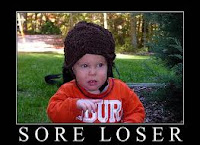Teaching Aspergers Children To Lose Gracefully
Question
Jack is attending speech therapy and we are trying to work on games without having a meltdown. If Jack is losing or sees another person is about to beat him at the game he completely loses control and has a meltdown. We have tried random games, board games (i.e., snakes and ladders). His meltdown would last a half hour before he can get himself back into control. Do you have any suggestions? He is obsessed about winning rather than playing for fun.
Answer
My Aspergers granddaughter (Kayla) and I played games most of her life when she was younger. The one thing I decided early on was that I would not "let" her win. I wanted to teach her that there are winners – and losers. I wanted her to know that sometimes she's going to be the winner, and sometimes her opponent will win. That's life!
Some games are games of chance. So when we played, she had the same odds of winning as I did. Other games are games of skill. When we played, I didn't go easy on her. I wanted her to play her best, and if she scored more points than I did – that's great. If not, I expected her not to behave like a sore loser. Of course, that's easier said than done. Many times when she lost a game she would have a tantrum and say that she did not want to play anymore. Other times she would beg me to play "one more game", hoping that she would win the next game for sure.
So, when you play games with your Aspergers child, you will have to deal with him losing and possibly not taking it so well. Here are a few suggestions on how to teach your child to lose gracefully:
- Choose an activity that requires cooperation as well as competition (e.g., freeze tag, red rover, or duck duck goose).
- Focus on how well your child is improving in a given game and not on the fact that they lost.
- If your child is the loser, offer to play again. He still may not win, but at least he gets another chance to try.
- Make it a rule that the winner has to say "good game" to the loser.
- Play games of chance to illustrate that sometimes winning depends on luck and not skill (e.g., games like “Candyland” and “Snakes and Ladders”).
- Play games that last forever, like Monopoly, in which your child (and you) will run out of steam before anybody wins or loses.
- To make the loser feel okay about losing, agree before the game starts that the loser will get a prize. For instance, picking the dessert for dinner (so there is actually some benefit to losing). Don't do this for every game, however.
By around age 4, children have many more skills than they did when they were younger, and they know it — and therein lies the rub. They're developing a sense of what they can do and often expect a lot of themselves. When reality clashes with that sense of their ability, they can take it hard. They're in constant motion, seeking out adventure. Especially around ages 3 and 4, children are very imaginative in their play and want to believe they're capable of much more than they really are. Rather than facing the harsh reality of their own limitations, they 'pretend.'
In a game where a boy has convinced himself that he's the greatest slugger of all time, “striking out” in the middle of his fantasy can bring on a collapse of his exaggerated sense of self, leaving him confused and uncertain. Losing, then, at anything from T-ball to Go Fish, may have less to do with the game itself and more to do with the sudden unpleasant reversal of expectations and emotions, which are on a bit of a hair trigger anyway.
Expect your child to be unhappy with losing – and realize that each time he does, he is developing emotional muscles that he would not be developing otherwise.
The Aspergers Comprehensive Handbook



